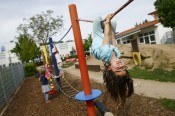Waldorf News
Stanford study finds improved self-regulation in kindergartners who wait a year to enroll

By Mae Wong
A new study on the mental health effects of kindergarten enrollment ages found strong evidence that a one-year delay dramatically improves a child’s self-regulation abilities even into later childhood.
According to the study co-authored by Stanford Graduate School of Education Professor Thomas Dee, children who started kindergarten a year later showed significantly lower levels of inattention and hyperactivity, which are jointly considered a key indicator of self regulation. The beneficial result was found to persist even at age 11.
“We found that delaying kindergarten for one year reduced inattention and hyperactivity by 73 percent for an average child at age 11,” Dee said, “and it virtually eliminated the probability that an average child at that age would have an ‘abnormal,’ or higher-than-normal rating for the inattentive-hyperactive behavioral measure.”
Findings from the study, which Dee co-authored with Hans Henrik Sievertsen of the Danish National Centre for Social Research, could help parents in the recurring debate over the pros and cons of a later school entry.
Prolonging play
The study’s findings also align with other research that has shown an extended period of early childhood play – such as in preschools – yields mental health developmental gains.
As a result, Dee said he hopes his research will lead to broader examinations on how kindergarten is taught. It could be pedagogy pointed more toward play rather than structured academics.
“It’s not just a question of when do you start kindergarten, but what do you do in those kindergarten classes?” Dee said. “If you make kindergarten the new first grade, then parents may sensibly decide to delay entry. If kindergarten is not the new first grade, then parents may not delay children’s entries as much…”
Read the rest of the article here at the Stanford Graduate School of Education News Center.

from Finland, Kai Pfaffenbach / Reuters
 Bay Area Teacher Training
Bay Area Teacher Training Space speaks. Its language is movement.
Space speaks. Its language is movement. Waldorf Training in Australia
Waldorf Training in Australia Middle School Science With Roberto Trostli
Middle School Science With Roberto Trostli Full-Time Teacher Education
Full-Time Teacher Education Apply Today: New Cohort Starts Nov. 2025
Apply Today: New Cohort Starts Nov. 2025 Quality Education in the Heartland
Quality Education in the Heartland Summer Programs - Culminating Class Trips
Summer Programs - Culminating Class Trips Bringing Love to Learning for a Lifetime
Bringing Love to Learning for a Lifetime Association for a Healing Education
Association for a Healing Education Great books for Waldorf Teachers & Families
Great books for Waldorf Teachers & Families Transforming Voices Worldwide
Transforming Voices Worldwide Train to Teach in Seattle
Train to Teach in Seattle Jamie York Books, Resources, Workshops
Jamie York Books, Resources, Workshops Immersive Academics and Arts
Immersive Academics and Arts Roadmap to Literacy Books & Courses
Roadmap to Literacy Books & Courses Waldorf-inspired Homeschool Curriculum
Waldorf-inspired Homeschool Curriculum
 The Journey is Everything
The Journey is Everything ~ Ensoul Your World With Color ~
~ Ensoul Your World With Color ~ Flexible preparation for your new grade
Flexible preparation for your new grade Caring for All Stages of Life
Caring for All Stages of Life Everything a Teacher Needs
Everything a Teacher Needs RSS Feeds
RSS Feeds